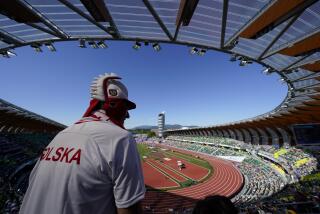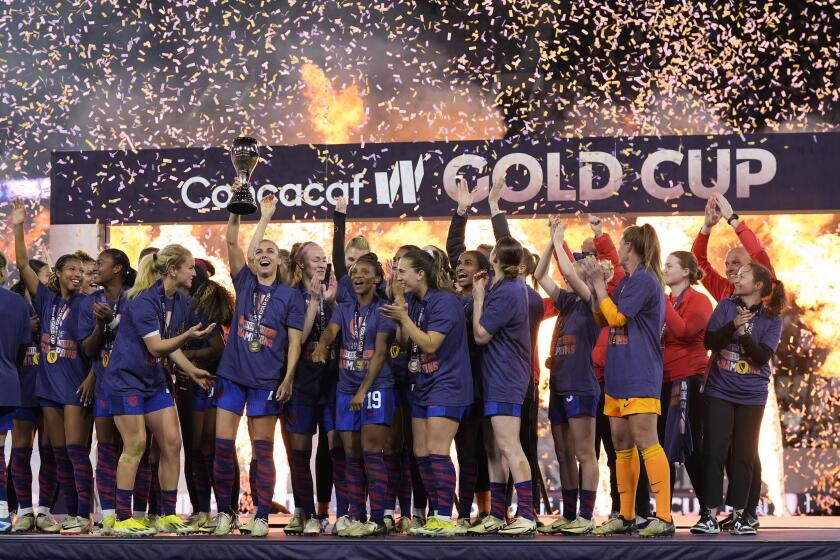Los Angeles group isn’t resting on its Olympic laurels
These weeks looking back and celebrating the Los Angeles Olympics of 25 years ago carry a false assumption, one that we’ve been there, done that, it’s over.
Not so fast.
Acquiring an Olympics is a bit like catching lightning in a bottle. And Los Angeles has done it twice: 1932 and 1984.
Enough?
Not to the Southern California Committee for the Olympic Games. The SCCOG has a history and a passion, even though its winning average is a tough-to-swallow one for 12. The group threw a big party in the Coliseum on July 18 that brought back Olympians and focused attention on what had taken place so beautifully from July 28 to Aug. 12, 1984.
But what they really do, what drives them, is doing it again, getting the Games back.
It all began with William May Garland, a banker and real estate developer who was part of a group of civic leaders in 1920 looking for a way to put L.A. on the international map.
Picture it: a dozen men in handlebar mustaches and top hats, sitting around a table in starchy suits and vests. Somebody mentions trying to get a World’s Fair. Somebody else brings up the Olympics. Garland says, what the heck, I’m going to Europe this summer. Why not just stop in on the boys who run these Olympic Games (being held in Antwerp, Belgium, that year, 1920) and tell them about Los Angeles?
The first question the International Olympic Committee asked: Where is Los Angeles?
Garland, apparently quite the smooth talker, left with a promise that if he built a stadium, they would come. By 1923, despite the economic woes of the time, Los Angeles had built the Coliseum. Garland then went back to the IOC, which awarded two Games on the spot, one to Amsterdam for 1928 and one to L.A. for 1932.
A city’s Olympic legacy had begun.
Garland became an IOC member and remained so through 1948. Los Angeles held its highly successful ’32 Olympics, and then, as now, decided to stay in the game.
With Japan at war with China, and with the 1940 Games scheduled for Tokyo, Garland and his newly formed SCCOG sensed both nationalistic duty and opportunity. The SCCOG offered the IOC a fallback plan, a place to bring the Games on short notice, should the specter of a widening war make Tokyo a bad choice.
With a world war at hand, the 1940 and ’44 Games were canceled. When the Olympics returned in 1948, it was to London, that city’s second time as host with a third set for 2012.
Yet the SCCOG remained a player, bidding directly to the IOC for the 1948, ’52 and ’56 Games and then, when the bidding format changed, to the U.S. Olympic Committee for every Olympics from 1960 to 1984.
Even after its second smash success, Peter Ueberroth’s 1984 Games, the SCCOG got back in the bidding game for the 2012 Games. But the USOC picked New York, which lost to London in the IOC vote.
Los Angeles tried for 2016 too but lost to Chicago, which is up against Madrid, Tokyo and Rio de Janeiro. The IOC will vote Oct. 2.
All of which brings us to current maneuvering and international sports politics.
There is no clear favorite for 2016. Should Chicago win, the SCCOG will go into hibernation because the likelihood of another U.S. city getting the Games quickly is zero.
But if Chicago loses -- especially if it loses -- the SCCOG will crank it up again.
The Chicago bid faces a complication. The USOC recently announced the creation of its own TV network, the Olympic Channel. The IOC has said it isn’t happy about that, that the channel violates contractual territory.
Certainly, back-room meetings are taking place now and negotiations may make this problem go away. Chicago has to hope so, because an unhappy IOC member is not a vote for Chicago.
In its own cause, the SCCOG does not dwell on the negative. With 12 bids and 11 defeats, it just keeps trying.
The ’32 Games and the ’84 Games were financial successes, and the IOC remembers that. Many of the venues from ’84 are still in place, and many more -- Staples Center, Home Depot Center, the Honda Center in Anaheim, etc. -- have been built since.
L.A.’s bid for 2016 was based on little need for venue building -- an idea full of economic sense but devoid of flash and dazzle. Some called it the “Do Nothing” bid.
In good economic times, bad approach. But in not-so-good times, the L.A. model may be the best way for the IOC to stage an Olympics.
There is a corollary to that. If a city already awarded a Games runs into problems, and time is running out, the best fallback is a city where everything is already in place.
Voila: Los Angeles.
David Simon, president of the SCCOG, calls the perception of L.A. as a fallback “both a blessing and a curse.”
Still, there is no denying that when Athens looked as if it couldn’t quite get it done for 2004 and IOC officials hovered nervously, L.A. entered the conversation. The SCCOG, while rooting for Athens to get it done, also knew which quick phone calls to make, were it needed.
The events leading to the October vote on 2016 will be followed closely by the SCCOG. And the goal will never change.
“There will be another Olympics in Los Angeles,” Simon says. “It’s just a matter of when.”
After Garland, the SCCOG leadership was eventually picked up nicely by, among others, local lawyers John Argue and Paul Ziffren. Argue died in 2002 and another lawyer, Barry Sanders, took over as chairman. Simon, a key member of the Los Angeles organizing committee in 1984, is the president and Casey Wasserman, grandson of legendary Hollywood executive Lew Wasserman, is vice chairman.
At 35, Casey Wasserman is the youngster of the group. Like Garland, Argue and Ueberroth, he has long held a civic and business commitment to L.A., and his age makes him the likely successor to their heritage.
And the SCCOG, the Energizer Bunny of Olympic movements, makes it likely that Wasserman’s generation will get to celebrate its own Olympics.
--
twitter.com/DwyreLATimes
More to Read
Go beyond the scoreboard
Get the latest on L.A.'s teams in the daily Sports Report newsletter.
You may occasionally receive promotional content from the Los Angeles Times.






